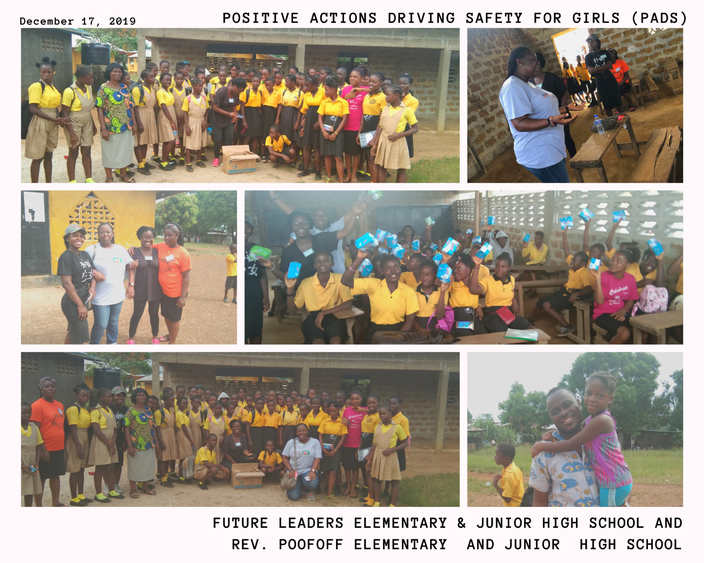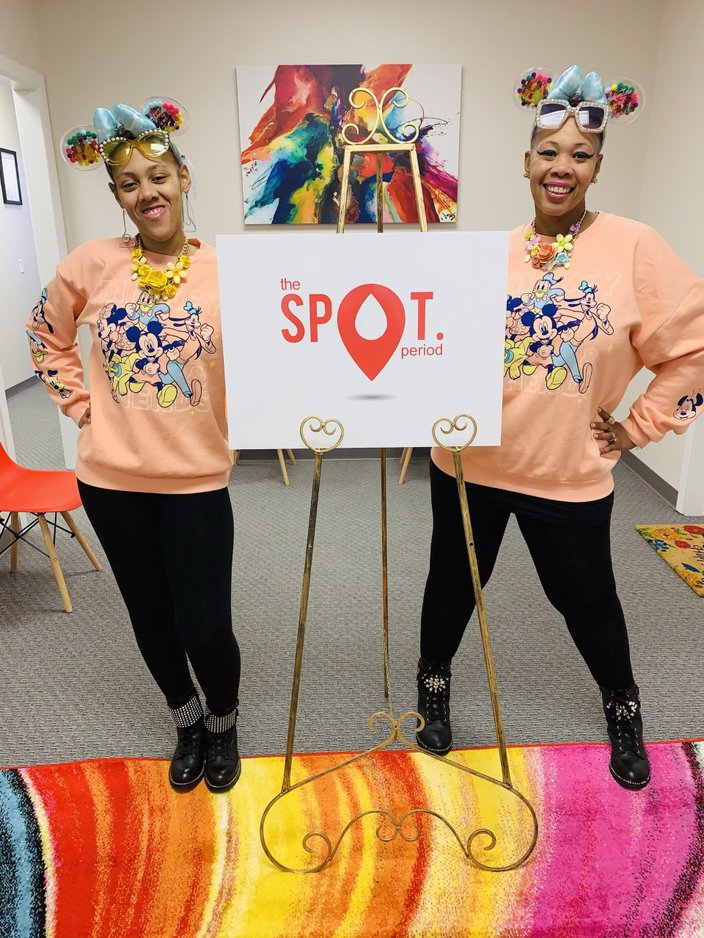
June 09, 2021
When Grace Clarke was growing up in Monrovia, Liberia, her family could not afford to buy menstrual products, like pads or tampons. Instead, she would use strips of old clothing or towels throughout the day.
This lack of access to period products, or the inability to purchase them, is known as period poverty.
The experience left such an impact that Clarke, who later moved to the United States, helped launch a nonprofit to deliver menstrual products to adolescents in Liberia with her sister, Lovette Qualah. She's also among several passionate women working to address period poverty in the Philadelphia region and beyond.
While Clarke experienced period poverty in Liberia, many U.S. residents also struggle to afford or obtain hygiene products. To manage their cycles, they resort to alternative products or use products for much longer than they are intended. This can cause health complications and infections, and lead to long-term health risks.
Research shows that 1 in 4 women struggle to purchase period products due to a lack of income, and 1 in 5 low-income women skip school or work because they don't have access to them.
In Liberia, many people will drop out of school after they start menstruating because they don't have access to period products, Clarke said. To address this issue, Clarke and her sister launched Positive Action Driving Safety for Girls, or PADS for Girls, an organization that has delivered products to 176 girls in nine communities. The organization also teaches the girls about sexual health, professionalism and entrepreneurship.
Clarke, who earned her Master's in Public Health from La Salle University this spring, said her own experience with period poverty inspired her to help.
"That was definitely an experience that made me understand the significance of the lack of pads and period products in our hometown," she said. "It's something that I can definitely relate to."
In Philly, Clarke worked with Shelby Davies, an adolescent medicine fellow at the Children's Hospital of Philadelphia, on a period poverty research project that increased screenings for unmet menstrual hygiene needs.
Data on how many people are experiencing period poverty in the city and U.S. is hard to measure because most of the research on the topic is limited, Davies said.
Grace Clarke helped launch PADS for Girls, an organization that delivers menstrual products to girls in her native Liberia. The photos above showcase people who have benefited from the products.
Lynette Medley, who co-founded No More Secrets with her daughter Nya Mcglone, experienced period poverty when she was younger and was surprised to hear it was still prevalent years later. So, she took initiative.
"This is my lived experience, I've experienced period poverty. My daughter's experienced period poverty," she said. "It wasn't a name back then because it was so normalized in our community in that this is what happened."
Earlier this year, they opened up The SPOT, a menstrual hub that offers free products, education, WiFi, information on food insecurity resources and more.
The local need has soared during the COVID-19 pandemic, Medley said. Deliveries for No More Secrets increased from about 85 weekly deliveries to 270 weekly deliveries during the pandemic.
That need has been felt across the U.S. A recent report by the nonprofit Period, The State of the Period, compared surveys taken of menstruating teens in 2019 to 2021 and found the pandemic caused a dramatic rise in period poverty in the U.S.
Period products are not covered in federal aid for low-income Americans. Rather, period products have been taxed as a luxury item, though more states, including Pennsylvania, have ended this so-called "pink" tax, according to NPR.
"I think [stigma is] still persisting in the powers that be," Medley said. "We don't receive any funding from the city in which we service because I still don't think it's deemed a necessity. I think it's changed within our community, because we've created the spaces to have the authentic conversations."
Davies said her research suggests a multi-pronged approach is needed to address the issue.
"So that is looking at the policy aspect of it, calling on legislators to make products more available in school bathrooms, public bathrooms," she said. "We know that lack of access to period products can lead to poor health outcomes, and so I think we need to start looking at this like a medical issue — a public health and medical issue."
Davies said she is currently collecting personal narratives from youth in the community "to understand and dive into the barrier and facilitators to accessing adequate menstrual health hygiene and then explore the shame and stigma around menstruating teens."
The Philadelphia-based nonprofit, No More Secrets, was founded by mother-daughter duo Lynette Medley, right, and Nya Mcglone to deliver menstrual products to people in need.
"I think it's an issue that does not get the attention it deserves right now," Davies said. "I think we ask youth all the time things about their period, like the duration, the amount of bleeding — and asking them if they have any barriers to getting menstrual products I think is as important to their genital and reproductive health as how often they are getting their period."
Lack of access to period products can cause hygiene issues, urinary tract infections and bacterial vaginosis, all of which can cause long-term health issues, including kidney damage. The stress of not having these products can also cause poor mental health, depression and anxiety.
Lack of access also can increase shame among minority communities.
"I already think it's hard enough for Black, brown, disabled, refugee, Latina populations to live in dignity, to succeed," Medley said. "There are so many other barriers, and to me, this is one of the things that they should not have to ask for, they should not have to struggle to ask for. This is a normal, natural part of life. A normal, natural function that, to me, is preventing people from reaching their full potential."
Schools with free lunch programs also should have free period products available to students, Medley said. She also wants to see the products added to federal assistance programs.
Though period poverty has been getting more attention lately, Clarke said she thinks products ultimately need to be made free. Last year, Scotland became the first country to make menstrual products free to its citizens. The government estimates it will cost about $32 million annually.
"Regardless, [the products are] always going to be needed," Clarke said. "So having access to free period products, whether it's started within school systems being able to provide these products for free for their students, it will definitely decrease the risk for menstrual hygiene."
Right now, Clarke is working to register PADS for Girls as a nonprofit in Liberia and the United States. Her ultimate goal is to create a space for women in Liberia to learn about their menstruation and health.
"My vision for our organization is that we really look into having our own women's clinic, where we can provide other means of health education, health-related needs that are lacking in our community," she said. "A lot of people that are lacking in Liberia do not have the resources to even be able to take care of themselves in the means of health."
Follow Hannah & PhillyVoice on Twitter: @hannah_kanik | @thePhillyVoice
Like us on Facebook: PhillyVoice
Add Hannah's RSS feed to your feed reader
Have a news tip? Let us know.
 Courtesy/Grace Clarke
Courtesy/Grace Clarke Nya Mcglone/for PhillyVoice
Nya Mcglone/for PhillyVoice